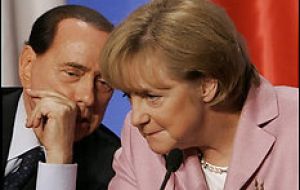MercoPress. South Atlantic News Agency
Irish “bail-out” rash rapidly extending to rest of Europe
 European gov. have pumped billions of euros into banks to keep them afloat
European gov. have pumped billions of euros into banks to keep them afloat Germany offered a blanket bank deposit guarantee on Sunday in a bid to contain the spreading credit crisis as European officials clinched deals to rescue Germany's Hypo Real Estate and recapitalize two other European banks.
From Iceland to Italy, officials scrambled to contain the fallout from the financial crisis amid a continued debate about whether a fragmented European response could keep pace with a fear-driven market. In a sign that the credit crunch is being felt in Asia, South Korea's finance minister said Korean banks were having trouble securing funds in foreign currencies and said the government would offer loans from its reserves. On Saturday leaders of Europe's four biggest economies, Germany, France, Britain and Italy, decided against a coordinated bank bailout, while vowing to stabilize markets. But in what would mark a stunning reversal after just a day Italian Prime Minister Silvio Berlusconi said on Sunday that Italy would revive the idea of a common bank bailout fund at a meeting of finance ministers on Monday. Germany shot back that it remained opposed to any such shared bank rescue fund like the US bailout. A French official said there was no fund proposal up for discussion. Meanwhile, Germany said it would guarantee deposits in German banks to protect savers. Austria and Denmark quickly followed suit with the same kind of blanket guarantee first offered by Ireland last week. "We say to savers that their deposits are safe," German Chancellor Angela Merkel said at a news conference in Berlin. "The federal government is also committed to that." The pledge came as German officials clinched a renewed rescue deal for lender Hypo Real Estate, Belgium and Luxembourg found a buyer for troubled financial group Fortis in BNP Paribas, and UniCredit, Italy's second-biggest bank, announced plans to raise new capital. In New York, Citigroup Inc won a court order blocking rival Wells Fargo & Co from moving ahead with its acquisition of hobbled US bank Wachovia Corp in a contested deal that also grew out of the credit crisis. But Wachovia insisted its agreement with Wells Fargo was valid and vowed to pursue the union. Meanwhile, expectations are building that finance leaders from the Group of Seven scheduled for this week in Washington could set the stage for coordinated rate cuts. US stocks are expected to remain under pressure after the sharpest single-week decline in seven years with loan markets still extremely tight. Monday will be a crucial day for Wall Street to measure the impact of the bail out package. In Berlin, the German government and banks agreed to a new rescue package for Hypo Real Estate. Banks and insurers had withdrawn their support for a government-led 35 billion euro rescue deal after problems came to light at the Munich-based lender. Under the revised deal, commercial banks and insurers would provide an extra 15 billion euros in liquidity for HRE in addition to the initial pledge of 35 billion euros. Germany's finance ministry said the deal would stabilize HRE, a key player in commercial property and infrastructure lending and government financing. BNP Paribas, meanwhile, struck a deal with the governments of Belgium and Luxembourg to take control of the key remaining assets of troubled financial group Fortis. BNP Paribas will buy 75% of the Belgian banking arm of Fortis as part of a deal in which Belgium will receive new shares in the French bank. In Milan, Italy's second-biggest bank, UniCredit, convened a special board meeting to ask shareholders for an additional 3 billion euros in capital to protect it from the crisis in international markets. In Iceland, officials, including the central bank, were at work on a financial stability plan to address a crisis that has sent the country's currency spiraling lower and is seen as threatening its financial sector. Iceland's government is also reported to be considering a 14 billion injection into the banking system, having bailed out the country's third largest bank, Glitnir, last week The banking upheaval that began on Wall Street has effectively shut down inter-bank and other loan markets and is seen as pushing industrialized countries towards recession.




Top Comments
Disclaimer & comment rulesCommenting for this story is now closed.
If you have a Facebook account, become a fan and comment on our Facebook Page!